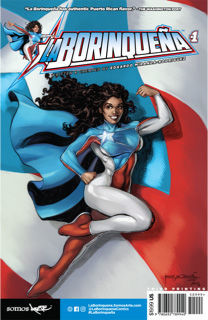Nuestras Raíces, the team of Pima County Public Library employees dedicated to serving Tucson’s Latino community, has helped gather nearly a dozen Latino authors to speak at 20 events and panels at this year’s Tucson Festival of Books.
Topics range from Latino representation in comic books to Mexican cuisine to social activism.
“We really value and appreciate our role at the Tucson Festival of Books because I feel that the library and Nuestras Raíces gives our Latino authors writers and artists an opportunity to speak for themselves and use their own voice and present their work,” said Paulina Aguirre-Clinch, a committee member of the Nuestras Raíces team. “I think what's so special is that a lot of our authors are activists too.”
One such author is Edgardo Miranda-Rodriguez, who has created his own unique role in the graphic novel world by curating comic art exhibits, contributing to Marvel comics and publishing his own series of bestselling graphic novels.
The first book he remembers reading was an autobiography of Malcolm X.
“That was a fascinating story about a man's journey and transformation and how he was able to find his own voice and persevere,” Miranda-Rodriguez said. “The resilience of his spirit was very inspiring to read and that actually opened me up to read about other biographies that are more about my experience as a Puerto Rican.”
This literature inspired Miranda-Rodriguez to create 'La Borinqueña,' his original comic book superhero and patriotic Puerto Rican symbol who fights crime with her superhuman strength, her ability to fly and her control of the elements.
“I love to have the ability to tell stories through imagery,” Miranda-Rodriguez said. “I would actually draw my own comic books as a child in elementary school and sell them. Not only was I really passionate about storytelling at that young age, I was already passionate about entrepreneurism and self-publishing. I've always been attracted to the conversations that really can explore the human spirit and the human experience and that universality that kind of thread that connects all of us.”
Miranda-Rodriguez will be joined by Latino pop culture scholar and The Ohio State University professor, Frederick Luis Aldama, for a Saturday panel entitled “Dreaming in Color: Latinx Comic Universe.”
Interested in supernatural powers but not a comic book fan? No problem.
Ecuadorian-born New Yorker Zoraida Córdova and her peers are busting their way into the mainstream with their urban fantasy novels.
“For me, urban fantasy is fantasy that showcases the magical with the mundane,” Córdova said. “It allows this magical world to live alongside and oftentimes right in the midst of regular people.”
The blossoming young-adult fiction writer recently won an International Latino Book award for her novel, "Labyrinth Lost," which and has also been optioned by Paramount Studios.
“I've loved this kind of fantasy my whole life simply because I grew up in Queens, New York and it was pretty boring,” Córdova said. “You know, life in Queens is like a more tight suburbia. I've always wanted more from the world than just the ordinary. You don't always have to escape to a place like Westeros or a completely other dimension. Sometimes the magic can be right in your backyard.”
While the fantasy books Córdova read as a child often did not explicitly mention the immigrant experience she was familiar with, she found that she could relate to these mystical characters with ease. Córdova itched to see herself in these magical worlds.
In the few years since Córdova began to get her books published, she has seen a notable shift in the diversity of her industry.
“My first two rejections were, “We already have a Latino book for the season,” Córdova said. “Nobody would dare say that now because they would get dragged on Twitter, but back in the day… I was afraid of writing characters of color because I didn't think that my publishers would let me.”
That all changed in her award-winning "Brooklyn Brujas" series. The trilogy of books follows three magical Latina sisters as they navigate a world steeped in Latin American mythologies and the embodiment of your abuela's superstitions.
“It's my love song to the girl that I used to be — the teenage girl that wanted to read book about magic with a witch that looked like her,” Córdova said.
The Nuestras Raíces team and their collaborators are especially excited about the “Radical Hope in Dangerous Times” panel, said Helene Woodhams, Literary Arts Librarian.
The panel will include writers and activists who contributed to Carolina De Robertis’ book “Radical Hope: Letters of Love and Dissent in Dangerous Times,” an anthology of letters intended to provide a dose of promise and inspiration to readers in these politically and socially uncertain times.
“She put out a call shortly after the last the presidential election looking for letters from authors and politicians and people who might have some message of hope to a constituency who, you know, as a result of the election were frightened,” Woodhams said. “In her view, this could mean a serious setback to civil rights. The response she got was overwhelming.”
The panel will feature Black Lives Matter co-founder, Alicia Garza, award-winning fiction writer, Celeste Ng, and Pulitzer Prize nonfiction finalist and Festival of Books veteran, Luis Alberto Urrea in addition to Robertis.
The Tucson Festival of Book will take place at the University of Arizona on March 10 and 11 from 9:30 a.m. to 5:30 p.m. Catch the “Radical Hope” panel at the Pima County Public Library stage on the University of Arizona Mall Sunday, March 11 at 11:30 a.m.





